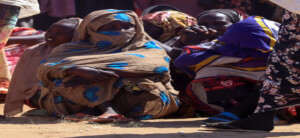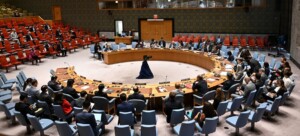Charters, agreements, conferences… quest to unite Sudan’s opposition continues
Sudan’s opposition has witnessed various calls and initiatives to overcome divisions and form a united front against the military junta that took power in the October 25 military coup. The resistance committees are working on unifying two charters, but the Forcer for Freedom and Change-Central Council refused to merge theirs.
 One of the many Marches of the Millions, often organised by resistance committees, in Khartoum North (Bahri) in which thousands of people participated (Khartoum Bahri Neighbourhoods Committees)
One of the many Marches of the Millions, often organised by resistance committees, in Khartoum North (Bahri) in which thousands of people participated (Khartoum Bahri Neighbourhoods Committees)
Sudan’s opposition has witnessed various calls and initiatives to overcome divisions and form a united front against the military junta that took power in the October 25 military coup. The resistance committees are working on unifying two charters, but the Forces for Freedom and Change-Central Council refused to merge theirs.
Sudan’s opposition forces have repeatedly called for more unity in the past months to overthrow the military junta and create more peace and stability in Sudan amidst a political landscape that continues to be divided.
The joint technical committee for the unification of the political charters of the resistance committees in Sudan called on the Sudanese people and all the resistance committees in the country to stand united around the democratic unity of the resistance committees and their political charters and “to participate in the making of the present and future of Sudan”.
In a statement on Friday, the joint committee called on the people to actively participate in the discussions that will be organised by the resistance committees, whose members are active in neighbourhoods and villages in Sudan.
They appealed to the people to raise their visions and proposals on the two charters issued by the resistance committees of Wad Madani and Khartoum “to produce a unified charter that expresses the aspirations and desires of our people for freedom, peace, and a decent life”.
Resistance committees’ charters
The resistance committees of Wad Madani, capital of El Gezira, and Khartoum published their own charter with their vision for a democratic civilian-led Sudan.
The resistance committees in Wad Madani launched the Revolutionary Charter for People’s Power (RCPP) in mid-January whilst the Khartoum resistance committees proposed the Charter for the Establishment of the People’s Authority (CEPA) in late February and signed it mid-May.
Both charters call for civilian-led democratic governance and prioritise social justice. However, they slightly differ in the tools they propose to implement these values.
The Sudanese resistance committees have been working on unifying both charters since June, to create a common stance. Originally, the deadline for the merging of the two charters was set to be July 5, but there were some disagreements.
Unifying all charters?
There has also been a proposal to unify all charters by groups opposing the military junta that took power in the October 25 military coup last year.
The Forces for Freedom and Change-Central Council (FFC-CC) published their own political charter earlier this month. They expressed their desire to consult with the resistance committees, although these have often felt excluded by the FFC.
On Sunday, the FFC-CC told Medameek online that they reject “the proposal to merge all initiatives put forward in the political arena into a single initiative” to end the political crisis and the constitutional vacuum. El Wasig El Bereir, leading member of the FFC-CC, explained that his group considers unifying the various initiatives “because it is unproductive and will not lead to a radical solution to the crisis”.
‘The FFC-CC rejects the proposal to unify the various initiatives because it is unproductive and will not lead to a radical solution to the crisis’ – El Wasig El Bereir
Support for unification
The United Sudanese Revolutionary Forces Abroad (USRFA) centre announced its support for a unified charter of the resistance committees.
The group said in a statement yesterday that “all revolutionary organisations affiliated with the centre declare their full solidarity and support for a unified charter, to establish the authority of the people for the first time”.
The centre also announced its support for the ongoing discussions about the unified political charter and explained that the charter is now to reach the final version.
The group appealed to “all Sudanese people and the revolutionary forces to support the charter and its democratic demands”.
The USRFA also supported the Resistance Committees’ efforts to prepare for a comprehensive civil disobedience action in the form of a nationwide “political strike”.
Khaled Omar Yousef, who was Minister of Cabinet Affairs in the Sudanese transitional government under former PM Abdallah Hamdok, also stressed the importance of creating a unified opposition in Sudan.
He told Asharq Al Awsat newspaper that the “junta authorities” are portraying Sudan’s political crisis “as a dispute between the civil [revolutionary] forces over papers or pacts,” but that this is fundamentally untrue. “The causes of the crisis are the October 25 coup and the forces that stand with it, who insist on clinging to power even if this leads to the fragmentation of the country,” he explained.
Yousef explained that this situation can only be ended by “unifying the forces of the revolution itself” because “the nature of the current conflict is between two camps, the camp of the coup and the camp of the forces opposed to it”.
‘The political crisis can only be ended by unifying the forces of the revolution itself’ – Khaled Omar Yousef
Pro-coup initiatives
He further said that “the coup authorities”, including remnants of the former dictatorial regime of Omar Al Bashir, are behind a number of initiatives that seek to impose a new reality “by confusing the scene with initiatives that aim to produce a formal civilian government in which the army maintains control from behind a curtain”.
One such initiative is the Sudan People’s Call initiative, which called for the army to assume political power in Sudan. The round table conference mainly involved the dignitaries of the former regime from the banned National Congress Party (NCP) and their allied groups. All of them hailed the October coup and expressed their political support for the military leaders who they perceive as their ‘saviours’.
The National Movement Forces, chaired by El Tijani Sese, is well acquainted with religious leader El Tayeb El Jed, chairperson of the Sudan People’s Call initiative. Sese, formerly head of the Darfur Regional Authority, recently called on the political groups in the country “to hold a round table to develop programmes for managing the transitional period and forming the government”.
Divisions
Calls to establish more unity between different opposition groups come after plenty of disagreements and splits in Sudan’s political landscape.
Recently, 12 political and activist groups including the Communist Party of Sudan (CPoS), the Sudanese Professionals Association (SPA), and the Sudanese Women’s Union formed the Forces for Radical Change alliance (AFRC).
This alliance does not include the FCC. According to Mohamed El Khateeb of the CPoS their exclusion is a result of their sympathy towards a power-sharing government with the military.
Activists further criticised the FFC in their dealing with the resistance committees concerning failed plans to establish a legislative council in late 2020, in particular with regard to representation quotas for the resistance committees.
In response, the FFC-CC stressed that it stands with the democratic transition and the overthrow of the coup and will not accept any initiative that keeps the putschists in power.
The FFC itself split up into the FFC-CC and the Forces for Freedom and Change-National Accord (FFC-NA). The group, also known as National Accord Forces (NAF), presented its own vision for a democratic Sudan last week.
The split-off group is dominated by rebel groups that signed the Juba Peace Agreement and support the coup d’état of October 25 last year. The Democratic Unionist Party (DUP) is an ally.
The NAF has always been keen on including the military in any agreements. The group, which announced its new structure in April, is presided by Mubarak Ardol, the former spokesmen for the Sudan People Liberation Movement-North in South Kordofan, who became director of the Sudanese Company for Mineral Resources during the rule of dictator Omar Al Bashir and his Islamist National Congress Party (NCP).
A workshop by the Sudanese Bar Association (SBA) envisioning a new transitional constitutional framework, which saw widespread participation from the FFC-CC and DUP, on August 10 concluded with a set of recommendations, including distancing the military from politics. The workshop, however, was attacked by lawyers affiliated with the Al Bashir regime and associates of various other right-wing political groups.











 and then
and then